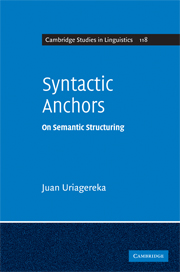Book contents
- Frontmatter
- Contents
- List of tables
- List of figures
- List of acronyms
- Introduction
- Acknowledgements
- 1 In defence of D-structure
- 2 So what's in a word?
- 3 Relational nouns, reference and grammatical relations
- 4 Online conditions and parametric variation
- 5 Prepositional case throughout
- 6 Iteration and related matters
- 7 (Re)Interpreting the Chomsky Hierarchy
- 8 Naturalizing meaning
- Epilogue: Evo-Devo-Perfo
- References
- Index
4 - Online conditions and parametric variation
Published online by Cambridge University Press: 22 September 2009
- Frontmatter
- Contents
- List of tables
- List of figures
- List of acronyms
- Introduction
- Acknowledgements
- 1 In defence of D-structure
- 2 So what's in a word?
- 3 Relational nouns, reference and grammatical relations
- 4 Online conditions and parametric variation
- 5 Prepositional case throughout
- 6 Iteration and related matters
- 7 (Re)Interpreting the Chomsky Hierarchy
- 8 Naturalizing meaning
- Epilogue: Evo-Devo-Perfo
- References
- Index
Summary
Introduction
In this chapter two analyses will be presented of rather puzzling phenomena, which can be naturally stated as conditions on narrow and broad online derivational stages, respectively. Importantly, these are not obviously reducible to ‘virtual conceptual necessity’, as relevant conditions within them exploit a substantive connection with semantic interfaces. Yet in these two cases systemic interactions are not output ones for the derivation (i.e. LF conditions), but are rather stated in terms of domains of lexico-conceptual dependency and so-called surface syntax. This, if correct, reinforces the distributed interpretation thesis. The arguments will each occupy a long section of this chapter, and can be examined in more detail in their published versions (Uriagereka 2003, 2006). Things get wrapped up, both technically and conceptually, in a unifying fourth section, which leads to a concluding discussion.
The null Case issue
Null Case was proposed by Chomsky and Lasnik (1993) in order to resolve some interesting empirical problems associated with the distribution of PRO. But as Hornstein (1999) points out, it is ad hoc to have a Case whose sole purpose is to be used this way. Uriagereka (2006) agrees that, therefore, either null Case should not exist, or else it must also be assigned to elements other than PRO.
- Type
- Chapter
- Information
- Syntactic AnchorsOn Semantic Structuring, pp. 106 - 144Publisher: Cambridge University PressPrint publication year: 2008



